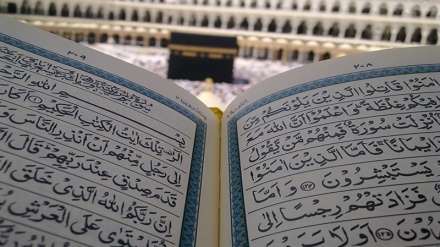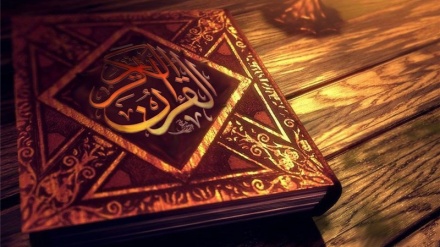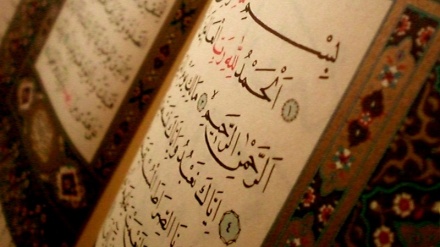Path towards Enlightenment (1046)
Welcome to our latest episode of “Path towards Enlightenment”, which is an endeavour to make you and us familiar with an easy and fluent explanation of God’s Final Scripture to all mankind, the Holy Qur’an that was revealed to the Last and Greatest of all Messengers, Prophet Mohammad (blessings of God upon him and his progeny).
Last week we started explanation of “Surah Muzzammil”, the number 73 in the serial order of compilation of the Holy Qur’an, and today we complete it.
It has 20 Ayahs, and revealed in Mecca in the early days of the Prophet’s universal mission of Islam, it opens by addressing him as “Muzzammil” or the “Enwrapped” in a cloak or sheet. This epithet means the one renouncing the vanities of the world or separating himself from all trifle matters for the purpose of meditation, which indicates the Prophet's preparedness to receive the Divine commandments to guide mankind. The Surah describes how God relaxed the early regime of devotion first decreed to the Prophet and prepared him for the weighty message of Divine Revelation. The Prophet is urged to be patient against the enemies and is informed in Ayah 10 of the punishment that awaits the disbelievers in Hell. Ayah 15 refers to the punishment that befell Egyptian tyrant, the Pharaoh, while alive, thereby drowning him in the sea.
According to a hadith from the Prophet, whoever regularly recites Surah Muzzammil, will not face hardships in this world and in the Hereafter.
We start from where we left you last Friday and invite you to listen to Ayahs 10, 11, 12, 13, and 14:
"And be patient over what they say and keep away from them in a graceful manner.
“And leave Me (to deal) with the deniers, the opulent, and give them a little respite.
“Indeed, with Us are heavy fetters and a fierce fire,
“And a food that chokes [those who gulp it], and a painful punishment [prepared for];
“The day when the earth and the mountains will quake and the mountains will be like dunes of shifting sand."
If you might recall, in our explanation of the previous Ayahs of this Surah last week, we said the midnight vigil is very effective in self-building through sincere worship, since It is the power of prayers and reflection on the flawless eloquence and timeless wisdom of the Holy Qur'an that provides us the clarity of vision to properly carry our daytime duties with reliance upon God Alone, rather than trusting mortals, however powerful – or fearing their malice.
In the Ayahs that we recited to you now, God tells the Prophet of Islam – and through him all Muslims – to be patient and tolerant in the face of those who ridicule. The best way is to keep away from them at times in a graceful manner in order to avoid their evil. Keeping away from opponents, however, does not mean not to fulfill our obligations and duties in society, which should be as firm as the resolve on the battlefield to decisively defeat the enemy, but lenient at the negotiating table to politely convey the truth to convince the other side. In other words, the Prophet and the believers are like a gardener tolerating the stings of thorns in order to pick up flowers.
As Ayah 11 says the matter of the obstinate deniers of truth, most of whom are opulent persons and hence arrogant, should be left to God Almighty, Who gives them respite to repent and reform, but if they continue to indulge in their sinful ways, as the next Ayahs warn, terrible punishment shall be their fate. The disbelievers and unrepentant sinners are warned of the fetters of Hell and its fierce fire, as well as inedible food that choke the throat, in contrast to the delicious food they had enjoyed in the world and indulged in the pleasures of the flesh. The severity of such torments is known to no one but God Almighty. The inmate of Hell shall be fed from the tree of Zaqqum, a bitter and poisonous plant of a foul smell.
On the Day of Resurrection the seemingly mighty mountains shall disintegrate and turn into soft sand in which feet sink.
From these Ayahs we learn that:
- The best way to confront insults and ridicule is to be patient and ignore them, instead of behaving in the same irrational way towards opponents.
- The true believer should act in civilized way by putting trust in God, without paying attention to the nonsense uttered by the insulters.
- Wealth and opulence often mislead many possessors to drift away from religion, ridicule believers, and indulge in cardinal sins, as history bears witness.
Now we invite you to listen to Ayahs 15, 16, 17, 18, and 19 of the same Surah:
"Indeed, We have sent to you a Prophet, to be a witness to you, just as We sent a Prophet to Pharaoh;
“But Pharaoh disobeyed the Prophet (Mosses); so We seized him with a terrible seizing.
“So, if you disbelieve, how will you avoid the day which will make children white-headed?
“And wherein the sky will be rent apart; His promise is bound to be fulfilled.
“This is indeed a reminder; so let anyone who wishes take the way toward his Lord."
These Ayahs begin by drawing a comparison between the Prophet of Islam who was raised as a witness over mankind, with Prophet Moses who was sent to guide the Egyptian Pharaoh. It is a warning to the polytheists to heed the terrible fate that befell Pharaoh for rejecting Prophet Moses’ message of monotheism and the path of truth. Those who persist in unbelief and sins are posed the question: What makes you think that your abominable sins and disbelief will keep you safe from Divine Wrath that makes the children grow old? The torments inflicted upon the disbelievers and unrepentant sinners on the Day of Resurrection shall be so severe, horrible, and harsh that the hairs of children will turn white due to the terrible shock. On that Day, in fulfillment of Divine Promise, the sky shall rent asunder to the extent that even the huge celestial bodies and planets shall be shattered by the terrible happenings; so how could mankind which is are weak and vulnerable by nature, shall face such incidents?
So, choose the right path that leads to the bounties of the All-Merciful Lord before death ends the transient life of the mortal world, and know that the Almighty Creator Who has endowed human beings with the gift of the intellect, wants them to properly recognize the truth and choose it out of free will, rather than imposing it upon them.
These Ayahs teach us the following points:
- Prophets are witness to the deeds of the nations they have been sent to guide, while Prophet Mohammad (blessings of God upon him and his progeny) and the Infallible Imams are witness over all our deeds.
- The accounts of the past generations are lessons to be heeded by the next and future generations, so as not to repeat the same blunders.
- There is no way of escape for the faithless from Allah's punishment on the day of Resurrection.
- The Almighty Creator has bestowed mankind, the best of creation, with the gifts of the intellect, speech, and free will to choose the truth with firm conviction.
In conclusion of this week’s episode of Path towards Enlightenment that marks the end of Surah Muzzammil, here is the last Ayah, that is, number 20:
"Indeed, your Lord knows that you stand vigil nearly two thirds of the night – or a half or third of it – along with a group of those who are with you. Allah measures the night and the day. He knows that you cannot calculate it (exactly), so He was lenient toward you. So recite as much of the Qur'an as is feasible; He knows that some of you will be sick, while others will travel in the land seeking Allah's grace, and yet others will fight in the way of Allah. So recite as much of it as is feasible, and maintain the prayer and pay the zakāt and lend Allah a good loan. Whatever good you send ahead for your souls you will find it with Allah [in a form] that is better and greater with respect to reward. And plead to Allah for forgiveness; indeed, Allah is All-Forgiving, All-Merciful."
This Ayah describes some of the characteristics of the true believers. It starts by emphasizing, or more properly re-emphasizing, the night vigil for performance of the non-obligatory post-midnight “tahajjud” prayer and recitation of the Holy Qur’an with contemplation – as we said last week while explaining the first Ayah of Surah Muzzammil. Thus, the first and the last Ayahs of this Surah, if studied together, make it clear that though the “tahajjud” prayer is highly recommended, it is not obligatory, yet its rewards are many. The phrase “along with a group of those who are with you” refers to the Prophet’s cousin, Imam Ali ibn Abi Taleb (AS), and to the loyal companion Abu Zarr Gheffari.
The Ayah endorses travelling and fighting for just cause. It stresses the punctual performance of the ritual prayer, and calls on believers to pay the zakat from surplus income to the poor people, help them with interest-free loans, and spend for good causes by calling such a practice “lend Allah a good loan”, which includes spending for good causes. It adds that whatever good one does is solely for his/her soul, and will be compensated by Allah much more than mere reward. It concludes with the commandment to plead the All-Merciful Creator for forgiveness, saying Allah is All-Forgiving.
The Ayah teaches us that:
- Islam is the comprehensive religion, which besides regulating the ritual prayers, commands resolving of social issues by helping the poor and for spending in the way of Allah without being despondent of Divine Mercy.
- Religious orders are in compliance with an individual’s condition, and all good deeds, whether they require travel or fighting for a just cause, entail abundant rewards from Allah, Who forgives those who repent.
RM/AS/SS


